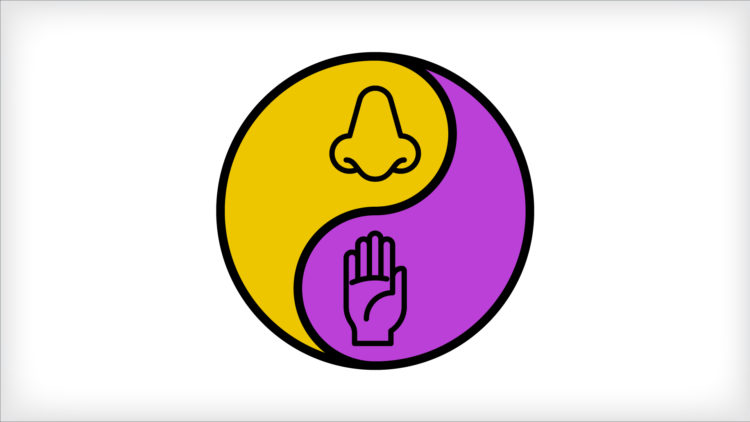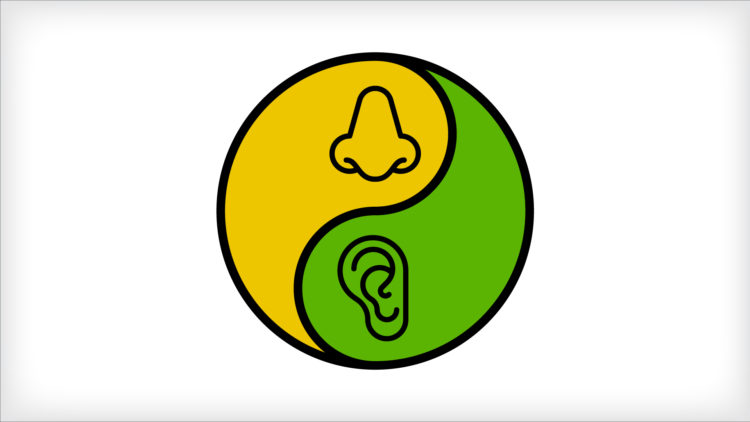

Making Sense of Self-Care
An Integrative Health Program to Engage Your Senses. This Week: Smell
First time here? Make sure to read the introduction to the series!
Action of the Week
This week’s self-care practice of Aromatherapy will utilize our sense of smell and ignite the other four senses: sight, touch, hearing and taste. With the use of lavender and/or lemon essential oils we will inhale calm and exhale stress. Research studies show the positive benefit of incorporating aromatherapy into your day like improved sleep and mood and stress management with lavender (Tull, 2021).
Essential oils can enter the body by inhalation. Let’s practice! Use a tissue, gauze pad, or cotton ball and sprinkle 2-5 drops of lavender or lemon essential oil and inhale. Take a deep breath in and feel the calming effect of lavender slowing down your thoughts and bringing your mind to ease. For an energy and mood boost take a few deep breaths of lemon and allow the vibrant fragrance to perk up your mind and energize your body. For maximum benefit, lemon is recommended in the morning and lavender before bed.
Many of our favorite memories are associated with familiar smells (Educational, 2016). There are many ways to enjoy fragrances without aromatherapy. Pause and smell the roses in a garden, take a moment to appreciate the aroma of fresh herbs in the kitchen, take advantage of the earth’s smells while walking in the woods. You can also get a sense of calm through scented candles, diffusers, lotions, teas and body wash (Tull, 2021). Taking five minutes each day with the one of the five senses, can help reduce stress levels and calm your mind-body

Smell and Sight
Color Therapy: Frankincense oil is an essential oil that can indirectly help to improve focus and concentration. Apply one to two drops on a cotton ball and breathe in calm and exhale tension. Following five breaths you may notice a better mindset, mental clarity, and a reduced level of stress and anxiety.

Smell and Touch
Acupressure: Large Intestine 20 - Yingxiang “Welcome Fragrance” is an acupressure point situated on the sides of your nose. Apply mild to moderate pressure for one to two minutes and sense your nasal passages begin to open, allowing you to smell more vibrantly. This point also aids in sinus congestion.

Smell and Hearing
Music Therapy: Work to connect with your senses of smell and hearing in tandem. For example, take notice of the auditory experience of making a cup of coffee. The sound of the machine brewing, the coffee hitting the pot as you smell the freshly brewed coffee, and eventually as it is poured into the cup. Take a moment to deeply listen and attune to these senses and their influences on your mind and body. Try to allow moments for these senses to enhance and liven your day.

Smell and Taste
Mindful Eating: Discover which food aromas connect you emotionally to the taste of the food. You can do this before you’ve even taken your first bite. How does it make you feel? Does it connect you to a memory of eating this food in the past?
From the Experts
Michelle Bombacie, Kenna Bouvet, & Dr. Melanie Gold
The use of essential oils for therapeutic purposes, dates back nearly 1,000 years. Essential oils are liquids extracted from flowers, herbs, and trees. Each oil has a characteristic fragrance, energetic resonance, and therapeutic benefit. They can induce calm, stimulate and balance; depending on the oil’s chemistry.
Additional methods for direct inhalation can be utilized with a bowl and towel: add 1-5 drops of essential oil in a bowl of hot water. Place a towel over your head, and keeping eyes closed, lean over the bowl and inhale deeply. For a room spray or mist: add 20-30 drops of oil to an 8 ounce mister bottle. Shake vigorously before and spray in room or on your skin.
Overall aromatherapy is very safe with few reactions. Most common adverse reactions are skin irritation and perception of fragrance as noxious. Avoid touching eyes, nose, or mouth with essential oils. This could activate your senses in too strong a way like burning and stinging the eyes. Always wash your hands well before and after use. Citrus oils (bergamot, lemon, orange, and grapefruit) are photosensitive; wipe off thoroughly prior to sun exposure. Be aware of skin sensitivities and irritations; for regular home use, do a patch test by applying 1-2 drops oil on a Band-Aid and keep on 12-24 hours, assess for irritation, redness, or itchiness. Exercise caution during pregnancy and with infants, toddlers and pets.
Resource Links
Enfleurage for personal use. NYC. Order on-line: https://www.enfleurage.com/categories/essential-oils/
Elizabeth Van Buren for hospital grade and 100% pure: https://elizabethvanburen.com/
DoTerra Oils: https://www.doterra.com/US/en
Young Living Oils: https://www.youngliving.com/us/en/categorylanding/essential-oils
References
- Ladas, E. J. & Kelly, K. M. (2012). Integrative strategies for cancer patients. Singapore: World Scientific Publishing Co.
- Young, D. G. (2003). Essential oils integrative medical guide USA: Life Sciences Press.
- Yuan, Jeffery. (2000). Materia Medica of Essential Oils (Based on a Chinese Medicine Perspective). Library of Congress Publications.
- https://www.verywellmind.com/coping-with-stress-using-self-soothing-skills-2797579
- https://www.educationalplaycare.com/blog/sensory-play-important-development/
- https://ww.nccih.nih.gov/health/aromatherapy
- https://bemoxe.com/blogs/news/what-essential-oils-are-good-for-focus-and-concentration#:~:text=Frankincense%20Essential%20Oil&text=Frankincense%20oil%20is%20another%20example,levels%20of%20stress%20and%20anxiety
- https://www.healthyhearing.com/report/52991-Essential-oils-for-tinnitus-and-hearing-loss-do-theywork#:~:text=Cajeput%20oil%2C%20geranium%20oil%2C%20lavender,loss%20and%20sensorineural%20hearing%20loss
